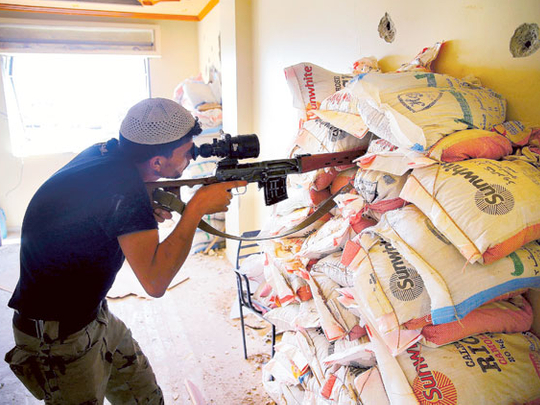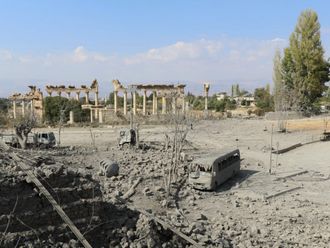
Beirut: Syria’s Western-backed political opposition plans to create the nucleus of a national army to bring order to the disparate rebel forces battling President Bashar Al Assad and counter the strength of Al Qaida-linked rebel brigades.
The latest attempt to unite the rebels coincides with fierce debates in Washington and other Western capitals over whether and how to boost support for Al Assad’s opponents after an alleged chemical weapons attack by government forces on Wednesday.
Chaos among opposition forces and Al Qaida’s growing role are barriers to any intervention. Plans for an army are still under wraps but details began emerging earlier this month before the gas attack.
It has the blessing of the rebels’ patron Saudi Arabia, which took over as the main regional backer of Al Assad’s foes earlier this year. “It is very serious. It will be a proper army. The future of Syria depends on this move,” said a senior member of Syria’s opposition National Coalition, which hopes to set up the force.
Momentum behind the new force comes from Saudi Arabia and Western nations who, alarmed by the growth of radical Islamists in rebel-held areas, have thrown their weight behind the Syrian Coalition, hoping it could help stem their power. “Once we get the (battle) field organised, then everything will be organised,” he said. “This will be the army of the new Syria. We want to integrate its ranks and unify the sources of funding and arms,” the Syrian National Coalition member said.
Saudi Arabia has prevailed over Qatar to impose itself as the main outside force supporting the Syrian rebels, in part to counter the influence of Qatari-backed Islamist militants.
Riyadh has put forward $100 million (Dh367 million) as preliminary funding for a force planned to be 6,000 to 10,000 strong, rebels say. Sources in the Coalition said the aim was to form a core of several thousand well-trained fighters that would also serve as the base for a bigger national army once Al Assad was toppled, avoiding a military vacuum and anarchy. More than two years of a revolt-turned-civil war have turned Syria into a magnet for jihadists from across the world, fuelling fears foreign military assistance might fall into the hands of fighters hostile to the West. That has served only to strengthen the hand of Islamist brigades whose regional backers, many of them private Gulf donors, have been more forthcoming with support. In recent weeks, Al Qaida-linked groups attacked several Alawite villages in the coastal province of Latakia, Al Assad’s stronghold. They also seized a strategic airport in Aleppo province that Syrian rebels failed for months to take.
Fighters from the Islamic State in Iraq and the Levant (ISIL) and the Al Nusra Front, both of which acknowledge the authority of Al Qaida leader Ayman Al Zawahiri, are now the ultimate rulers in many rebel-held towns.
The authority of the Supreme Military Council — the latest body that Western and Gulf powers have promoted as a moderate, unified rebel command — is increasingly challenged by radical Islamists and foreign jihadists, most recently when an Iraqi Islamist killed one of its senior commanders.
The Military Council demanded that the man, Abu Ayman Al Iraqi, be arrested, but he remains at large, playing a prominent role in rebel campaigns. Rebel commanders contacted by Reuters in Aleppo, Idlib, Raqqa, Homs and Damascus said they feared the new army would deepen divisions among rebels and lead to further infighting. Comments from Islamists played into those fears.
“The real goal behind this army is that they want to fight Islamists,” said a commander of a powerful Islamist brigade in Idlib province. “It’s an open game. They will not announce it now or immediately, but this is the long term for it ... We will not join, for sure. Not only us, but many others, too.”
A source in Aleppo close to Al Nusra Front said: “With every passing day, those living outside are becoming tools to the West ... They fear Islam and see it as the enemy. Unfortunately, some Syrians are falling into this trap.”
Western-backed rebels say the new structure might be modelled on US-backed militias, known as “Awakening Councils”, which drove Al Qaida from Iraq’s Anbar region six years ago. The leader of one moderate Islamist brigade, which operates in several parts of the country, said he supported the proposal, but would not say if his fighters would join. Leaders of more radical groups see it as a Western-backed plot to fight them. “They are undermining the work of all of us.
They want to throw it in the bin, as if it never happened,” said a senior commander in Homs province. Opposition political sources were careful not to portray the new army as a challenge to Islamists, but a senior official said it would only welcome them if they left their brigades.
“This will be an army like any other army in the world. When you join it you leave your beliefs outside. Islamists can join as individuals, not as Islamists.”
The new body is not an alliance of brigades, as in previous attempts to unify insurgency groups; individual fighters will be expected to leave their units to sign up.
The Homs commander said that showed the real intention was to dismantle the Islamist units. “This thing is very suspicious,” he said. Many Syrians initially welcomed the Islamists for bringing order to the chaos of rebel-held territories, but growing resentment of their puritanical rule could win popular sympathy for any new force that challenges them.
Activists in the northern, rebel-held provinces, where Islamists are most powerful, say those criticising the Islamists are threatened or imprisoned.
“We have challenged Al Assad when he was strong, and now we are being bullied by radicals who are not even Syrians in our Syria,” said an activist in Aleppo who declined to be named. With weapons and money flooding into the country, a class of warlords has emerged, including Islamists, who have grown powerful on arms deals and oil smuggling. Activists in the north complain of high levels of theft, bullying and thuggery.
“With this army the Coalition will have a military force on the ground, one that is composed of the best Syrian fighters,” said a Syrian rebel commander in a powerful brigade that has fighters across Syria.
Coalition leader Ahmad Jarba “wants to strike with an iron fist”, he said, adding that the Saudi-backed Jarba wanted all weapons entering Syria to be overseen by his coalition. However, the Al Qaida-linked rebels control many border crossings in the north, giving them strong influence over what enters the country and who gets hold of it.
The proposed new force must also overcome the same scepticism many fighters feel towards the Military Council. A rebel commander in the north-eastern Raqqa province, voicing widely shared views, dismissed the body as ineffective and subject to foreign influence.
“They do not have a presence on the ground. They left us on our own. When we need them, they are not here, and then they come and ask us: Where are you getting your funding from? Well, not from you for sure.
“They are only performing external agendas. They don’t know what is happening inside; their people tell them Islamists are the enemies, you need to fight them to get funding, so they come to us and they say: Yes, let’s fight Islamists.”
Sources say the army will be launched, at a date yet to be fixed, in Deraa, the southern province that was the cradle of the 2011 uprising and where the presence of jihadists is still relatively weak.
Jordan is now playing a bigger role in helping the rebels and is more flexible in allowing weapons to enter the southern front, the sources said. A military operations room to oversee the battle in the south is now in Jordan and includes Saudi, Syrian and American officers.
One of the sources said Manaf Tlas, a senior army officer and former friend of Al Assad who defected last year, is also a member of the joint operation room. He is close to Jarba and has good ties to Saudi Arabia. His name has been floated as the chief of the new army. But many rebels distrust Tlas because he waited months before defecting, and his father served as defence minister under Al Assad and his father, Hafez Al Assad, for three decades.
A Coalition official declined to say whether Tlas would head the new army but said he would welcome him having a role. “The man has been an advocate of this from the beginning.”
However, an Islamist commander in Aleppo said Tlas’s leadership would be “another reason why we will not join”. In the meantime, most agree that the disparate groups should work together, at least in temporary alliances against Al Assad’s troops.
But they share a scepticism that the new group will ever see the light of day, or have much impact if it does.
“During this revolution we have seen many great ideas and many great attempts destroyed because of mismanagement. The Free Syrian Army is an example of this. As long as the roots of the problems are not solved, then nothing will change.”
“They are all failed projects; there is no awareness among those leading this revolution and also there is no clear strategy. In addition to this you have got the hesitation from the West. As long as this continues, this will be a failed project.”






